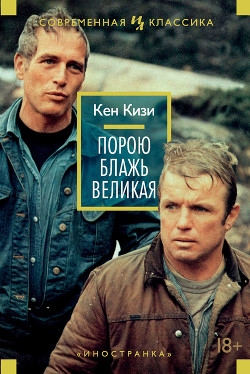| | | Порою блажь великая Оценка:  9.6 (5) 9.6 (5) Количество страниц: 45 Доступен ознакомительный фрагмент | Язык книги: Русский Язык оригинальной книги: Английский Название печатной книги: Порою блажь великая Издатель: Эксмо ISBN: 5-699-1748-5, 978-5-699-29186-1 | |
|
| Выберите формат скачивания: | В орегонских лесах, на берегу великой реки Ваконды-Ауги, в городке Ваконда жизнь подобна древнегреческой трагедии без права на ошибку. Посреди слякоти, и осени, и отчаянной гонки лесоповала, и обреченной забастовки клан Стэмперов, записных упрямцев, бродяг и одиночек, живет по своим законам, и нет такой силы, которая способна их сломить. Каждодневная борьба со стихией и непомерно тяжкий труд здесь обретают подлинно ветхозаветные масштабы. Обыкновенные люди вырастают до всесильных гигантов. История любви, работы, упорства и долга оборачивается величайшей притчей столетия. На этой земле полутонов во множестве, однако не бывает полумер и ничего невозможно сделать вполсилы. Перед вами грандиознейший роман ХХ века, и написал его Кен Кизи — великий американский писатель, гуру 1960-х, «веселый проказник» и «человек от земли», джек лондоновский персонаж и глашатай новой реальности. «Порою блажь великая» — наконец-то в новом переводе. | | Поделиться: | ]]> :3]]> ]]> :3]]> ]]> :]]> ]]> :]]> ]]> :2]]> ]]> :2]]> ]]> :4]]> ]]> :4]]> ]]> :2]]> ]]> :2]]> ]]> :3]]> :3]]>  :0 ]]> :0 ]]> :3]]> :3]]> | | Мой статус книги: | | |
|
 Ключевые слова: Ключевые слова: | | | | Добавить ключевое слово |
| *.*.215.247 |
очень кумарило это повествование от разных героев, которые в одном абзаце могут меняться. но шарм действительно какой-то, очень погружаешься. история интересная и очень красиво написано, читал издание pocketbook с матами. и всё-таки я не понял концовку - вив очень похожа на мать лиланда (на фото с ребёнком)? почему она уехала сама (куда?)? зачем в итоге ли вернулся к хэнку для сплава всей партии (это типа показать характер? лучше быть гордым и сильным как хэнк?)?
Then nothing else would be stirring—or so it would seem. But gradually her ears would pick out tiny rustlings in the vines nearby, where the grosbeaks were waking. A mourning dove would call unseen from the thicket below—a round, clear, bouncing note, as though a soft ball had been dropped on the lowest key of a xylophone: “Tuuu . . . tuu tu tu.” Another dove would answer a distance away. They would call again, closer to each other each time; then they would emerge together from the mist, of the mist, gray, graceful, and be off together wing to wing like reflections of each other in a looking-glass sky. The red-winged blackbirds would wake all at once, like soldiers to Reveille. They would shake themselves from the bam grove and swing in a glistening pack to settle in the nearby bunchberry vines, where they waited for the mist to lift from the cattails, singing incessantly or drawing the black feathers of their wings and tails slowly through their bills. With the bright scarlet amulets on each shoulder of their black uniforms they always made her sure that they were preparing for a review by the king. Then the blue grouse would drum away its kin, and the dowitcher would voice its piercing alarm at seeing the sun. The band-tailed pigeons would call seductively from branch to branch, all with voices like Marlene Dietrich’s. The flickers and sapsuckers would begin knocking the trunks of hemlocks for breakfast. . . . And after all the other birds were up and about their affairs—even after the jay, who would burst each morning from the mist, screeching in a blue rage at these damned early birds who never let a fellow finish his rest—the crows would make their stately entrance. From the tops of the firs they would swoop, laughing with a sort of pitiless amusement at the lesser birds, and circle away in a slow, disorganized flock bound for the mudflats, sometimes leaving her feeling strangely disturbed. Perhaps because they reminded her of the magpies from around her Colorado home—carrion-eaters, lining the rabbit-killing highways, living off death—but she thought there must be more to it than just that. Magpies were, all in all, rather silly birds. The crows, for all their raucous laughter, never seemed silly. When the last of the crows had gone she would drink the coffee and return the plastic sack to the shed and start back, whistling for the dog. On the way back she would go by the orchard and kick the old cow awake, then go on to the house to clean up after breakfast. By the time she finished dishes the cow was lowing at the barn door to be milked.
когда выросту, обязательно прочитаю в оригинале))
Оценил книгу на 8 | | Поделиться: ]]> :0]]> ]]> :0]]> ]]> :]]> ]]> :]]> ]]> :2]]> ]]> :2]]> ]]> :0]]> ]]> :0]]> ]]> :0]]> ]]> :0]]> ]]> :0]]> :0]]>  :0 ]]> :0 ]]> :0]]> :0]]> |
|
{"b":"132714","o":30} |

